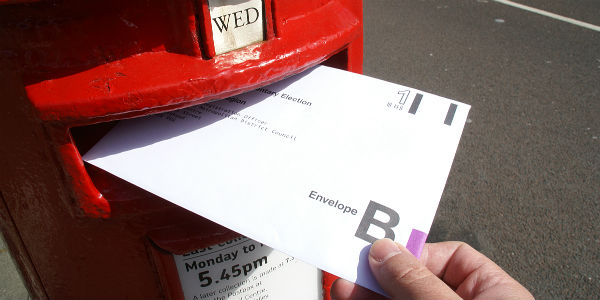What if postal votes were a great way to boost political engagement?
Eric Pickles’ recent report on electoral fraud raised concerns that postal votes represent an opportunity for voter fraud. But Justin Reedy suggests that filling out a postal ballot gives people more opportunity to discuss their choice with friends, family and neighbours – and potentially make better-informed choices as a result.

Photo: Ian Britton via a CC-BY-NC 2.0 licence
Postal voting is usually touted as a democratic reform meant to improve voter turnout and make elections more accessible to a wider range of the public. However, vote-by-mail elections also seem to boost political participation in another key way: by giving citizens an opportunity to talk to one another about their vote choices just before or even while filling out their ballots.
Modern democracies place a high value on public discourse about political issues – as citizens in democratic systems, we organise and take part in town meetings, public forums, candidate debates, informal chats, and countless other examples of people talking to one another about public issues. These political conversations help us articulate our own views on issues, expose us to others’ views, and even challenge our opinions (and possibly change our minds) as a result of new information or compelling arguments. Elections and polling places, however, are often seen as apolitical spaces, free from campaigning and distinct from the debates that led up to the election itself.
In voting by mail systems, though, in which people are free to fill out their ballots at a time and place of their choosing—at home, for instance, or even in some kind of social gathering—some people are engaging in political conversations with their fellow voters as they do so. In research we conducted in the state of Washington from 2006-08, during a transition from widespread absentee voting to statewide vote-by-mail elections, my colleagues and I found that about one third of absentee or postal voters who had already voted said they had talked with other people about their choices just before or while they filled out their ballots. And of that group, about one third said that these discussions influenced their vote choices.
When my colleagues and I set out to study this phenomenon, we wondered whether traditional predictors of political engagement—factors like socioeconomic status, political knowledge, attention to political news, and a history of other forms of participation—might also predict whether people are likely to become what we called “absentee discussers” or “vote-by-mail discussers.” However, a 2005 study by political scientist Sean Richey suggested that voting by mail might encourage political participation more broadly than just among the usual suspects. Richey, using data from the 1998 and 2000 American National Election Survey, found that voting by mail made one more likely to engage in political discussion in general. Our own findings reflect this, as well: most traditional predictors of engagement were not predictive of being an absentee discusser, though strength of partisan identity did make it more likely that one would engage in a vote-by-mail discussion.
In addition to being a phenomenon that is not just limited to those who are already quite politically engaged, vote-by-mail discussion also seems to be helping people talk with fellow citizens with whom they disagree, and with citizens who may be more politically knowledgeable. About a third of absentee discussers perceived their discussion partners to be more politically knowledgeable than them, and that figure rose to about 40 percent for those who had low or moderate levels of political knowledge (as measured by a scale of standard questions about political topics). And though agreement was the norm within these conversations, about 30 percent of absentee discussers said they disagreed with their discussion partners some or most of the time.
These results provide some hopeful news about political discussion. Though many of our political conversations with other people is often about agreement, vote-by-mail discussions seem to involve a substantial minority of participants encountering political disagreement and imbalances in political knowledge. Those can be challenging for citizens—many people find disagreement and debate to be disheartening, and some people avoid politics entirely because they feel they don’t know enough about it.
Our research results on vote-by-mail discussion should be taken with a grain of salt, however, since it represents some of the first analysis of this phenomenon, and was situated in only a single political context in the United States. Other postal voting systems around America and elsewhere around the world may see different patterns of behaviour among people voting by mail and talking about their ballot choices with fellow voters. More research is needed to better understand the effects that this kind of discussion is having on voter decision making.
In addition, we need to learn more about how postal voting might change the electoral calendar for some voters who complete their ballots before the traditional “election day.” This might lessen the impact of news and events that unfold late in the campaign cycle, like the FBI director’s letter about Hillary Clinton that was released shortly before the 2016 US presidential election, or the murder of MP Jo Cox in the days leading up to the UK’s EU membership referendum.
Though the effects of postal voting and the opportunity it creates for citizens to talk about political issues seem to be fairly positive, we should also take note of possible negative side-effects of such democratic innovations. A recent report commissioned by the UK government noted that postal voting might lead to additional opportunities for voter fraud, and suggests some safeguards for UK voting systems to prevent such problems. States in the US that conduct vote-by-mail elections have successfully updated their voting systems to prevent such fraud (using automated signature verification, for instance), but such options may be more of a challenge for governments with limited postal-voting participation. The UK report also raised the possibility of voter coercion, since postal ballots are not necessarily “secret” ballots like those at a polling place. For all of the households in which family members gather to talk democratically about their ballot choices, how many households have a domineering or abusive family member who forces others to vote in a particular way? This would be extremely challenging to study systematically, but perhaps this information could help design a system to prevent such coercion from affecting voters.
Excitement about vote-by-mail political discussion should be tempered by concerns about its possible downsides, but we can take heart in knowing that many people seem to be using postal voting as an opportunity to engage with their fellow citizens, rather than to retreat from the public sphere.
This post represents the views of the author and not those of Democratic Audit.
 Justin Reedy is an Assistant Professor in the Department of Communication and Research Associate in the Center for Risk & Crisis Management at the University of Oklahoma.
Justin Reedy is an Assistant Professor in the Department of Communication and Research Associate in the Center for Risk & Crisis Management at the University of Oklahoma.





 Democratic Audit's core funding is provided by the Joseph Rowntree Charitable Trust. Additional funding is provided by the London School of Economics.
Democratic Audit's core funding is provided by the Joseph Rowntree Charitable Trust. Additional funding is provided by the London School of Economics.
It is worth saying that when all-postal voting was experimented with in the UK, there was a huge takeup and turnout boost.
Here’s my paper on that: https://tobysjamesdotcom.files.wordpress.com/2013/11/james-2011.pdf
There is little point in referring casually to the important issue of coercion in regard to postal voting – it sounds flippant to dismiss this serious problem in many communities, eg where women have to vote the way the men tell them…’design a system to prevent coercion’, really? Cameras in every home? Visits from the Postal Vote Police?You know that is not possible.
The fact is that widespread postal voting on demand IS more open to corruption, vote farming and dodgy practices. If most able bodied people available at their homes on polling day really cannot get to the place where voting takes place, it is questionable really whether they want to vote anyway.
The way to make people more interested in voting is to give them a real choice, which appears to be gradually happening through parties like UKIP and the Greens in the UK. Otherwise you effectively feel you are voting for Tweedledum or Tweedledee – the LibLabCon Party. You get the same policies really whoever you vote for. Departure from the EU will help, because quite simply it currently makes most of the UK’s laws, which cannot be amended or repealed by the UK government… eg when Jeremy Corbyn suggested People’s Quantitive Easing he was told No Way by the EU, so guess where that one has vanished into? Thin air – the unelected characters over there in Brussels would simply use the UK courts to strike it down were he elected, rightly so as the law currently stands…so you CAN in future have a choice and vote for a change if offered. “EU says No” will no longer be the constant refrain in the corridors of power.